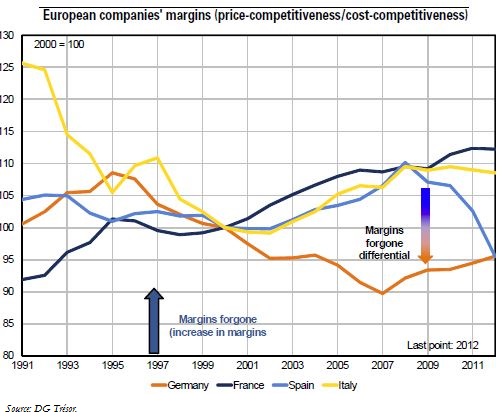Trésor-Economics No. 124 - Challenges facing the French manufacturing sector
Developed economies are experiencing de-industrialisation due to higher productivity gains in industry and the structural shift in demand towards services. However, its pace varies across countries, partly reflecting manufacturing sector's competitiveness gaps vis-à-vis foreign competitors. Although it possesses a diversified manufacturing base and flourishing multinationals, France is de-industrialising faster than some of its European neighbours. This could reflect both the difficulties French manufacturers are experiencing in foreign market and a drop in France's attractiveness as a manufacturing location.
The French manufacturing sector nevertheless continues to produce powerful spillover effects on the rest of the economy and remains one of the main sources of productivity gains. The growing importance of services in total employment has gone hand-in-hand with diminishing productivity gains in the French economy between 1990 and 2008. Failing a significant improvement in service sector productivity, the continuing decline of manufacturing and the recent slowdown in productivity gains in manufacturing itself could jeopardise the long-term growth of the French economy.
The difficulties French manufacturers face in foreign markets partly stem from deteriorating cost-competitiveness. Unit labour costs (ULC) in manufacturing have risen faster in France than in some other countries, Germany in particular. French manufacturers have also experienced a rise in the cost of their inputs of goods and services. This deterioration in their cost-competitiveness has forced them to reduce their margins in order to preserve their price competitiveness, which may in turn have delayed modernisation of their production plants and equipment. Moreover, French companies appear less able to single out their products along non-price characteristics (innovation, know-how and rbrand recognition), making them more vulnerable to international competition.
In addressing these difficulties, with their varied and interdependent sources, the first role of government is to design a business-friendly environment via coordinated "horizontal" measures, regarding the issues of labour costs, financial costs, legal and tax environment for corporations, scientific and technical training, support for R&D, as well as non-technological innovation. The use of effective "vertical" policies to support certain industries should seek to remedy market failures specific to each sector (e.g. the non-rivalry) of R&D, spillover effects on other sectors, difficulties in raising funds, availability of human capital, natural monopoly situations requiring regulation, etc.).
